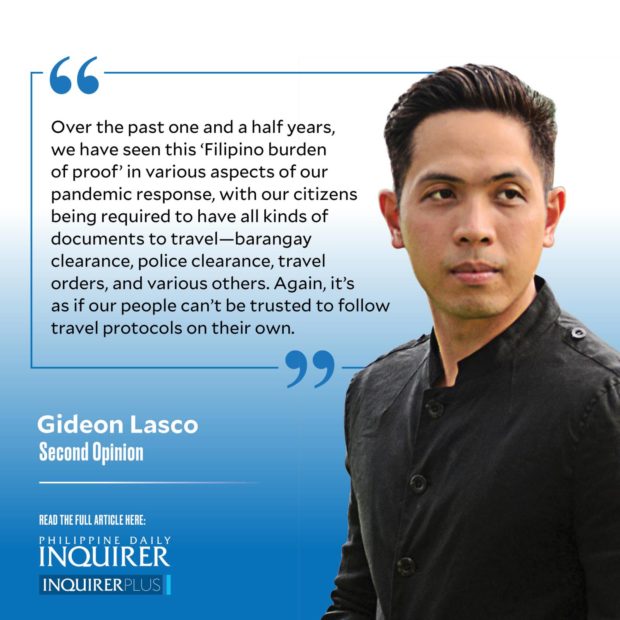The Filipino burden of proof

One example that would have come to mind, especially before the pandemic, is the need to show so many documents just to apply for a visa—from bank statements to an NBI clearance. It’s as if the Filipino traveler must disprove the assumption that he’s going to travel for illegitimate purposes.
But it’s not just that we must prove ourselves to others, we must likewise prove ourselves to our own institutions—universities, hospitals, banks, government agencies.
Article continues after this advertisementAs an academic, for instance, it frustrates me that just to reimburse the registration fee I paid for a conference, I have to show a (1) conference registration, (2) certificate of attendance, (3) conference program with my name on it, (4) receipt of conference fee, and (5) billing statement of credit card I used to pay for the fee. It’s as if my word of honor as a researcher, coupled with one or two of the above, isn’t enough and I must overcome, beyond (un)reasonable doubt, the presumption that I will swindle my own university.
As a hiker, I think the decision of some local authorities to require medical certificates—even before COVID-19—from those who want to climb a mountain is also a reflection of such thinking. It’s as if hikers can’t be trusted to make a decision on whether they’re fit to climb for themselves.
Over the past one and a half years, we have also seen this “Filipino burden of proof” in various aspects of our pandemic response, with our citizens being required to have all kinds of documents to travel—barangay clearance, police clearance, travel orders, and various others. Again, it’s as if our people can’t be trusted to follow travel protocols on their own. Again, informing all of these burdens of proof is the presumption of irregularity that most Filipinos must contend with, and in this particular example I feel that more than mere distrust, there’s also the bureaucratic reflex to impose all kinds of requirements.
Article continues after this advertisementOf course, when it comes to public health, there’s a point to be made that there’s a need to “trust but verify.” For instance, given what’s at stake with COVID-19 protocols, it’s entirely reasonable for people to demand vaccination certificates that can be cross-checked against a database, especially because it’s even easier to fake a vaccine card than a valid ID.
But it’s also important to emphasize that all of these requirements end up encumbering individuals. Will people need to fake vaccine certificates if it’s easy to get a real one? Instead of problematizing the possibility that people will fake their vaccine cards, shouldn’t we be focusing on making it super easy to get vaccinated?
Incidentally, one of the barriers to vaccination has been this “burden of proof” that I speak of. Especially during the initial stages of the vaccine rollout, there were reports of people being refused vaccination because they didn’t have PhilHealth numbers or cards (for which, in turn, you need valid IDs to apply). In contrast, here in the US, you don’t even need a single ID to get vaccinated.
This “burden of proof” affects most of us in different ways, but it is particularly difficult for poor individuals, and those in the informal economy, for whom even a valid ID—the most fundamental of those proofs—can be elusive, even as they are subjected to these requirements the most. And so this burden creates another layer of discrimination in our country.
Moreover, it undermines productivity and efficiency. Why bother to attend an academic conference or apply for a research grant if it will take several months and so many requirements to have your expenses reimbursed? And why invest or decide to stay in an environment where such burdens of proof, most of which are unnecessary and redundant, are rife?
Finally, it perpetuates a culture of distrust that ultimately boomerangs on our national objectives. The government wants the people to trust it, but does it trust the people back?
Of course, there are instances when we do need to verify people’s identities and intentions. But if we are to empower our people, I think we must learn to trust one another more.
glasco@inquirer.com.ph
















